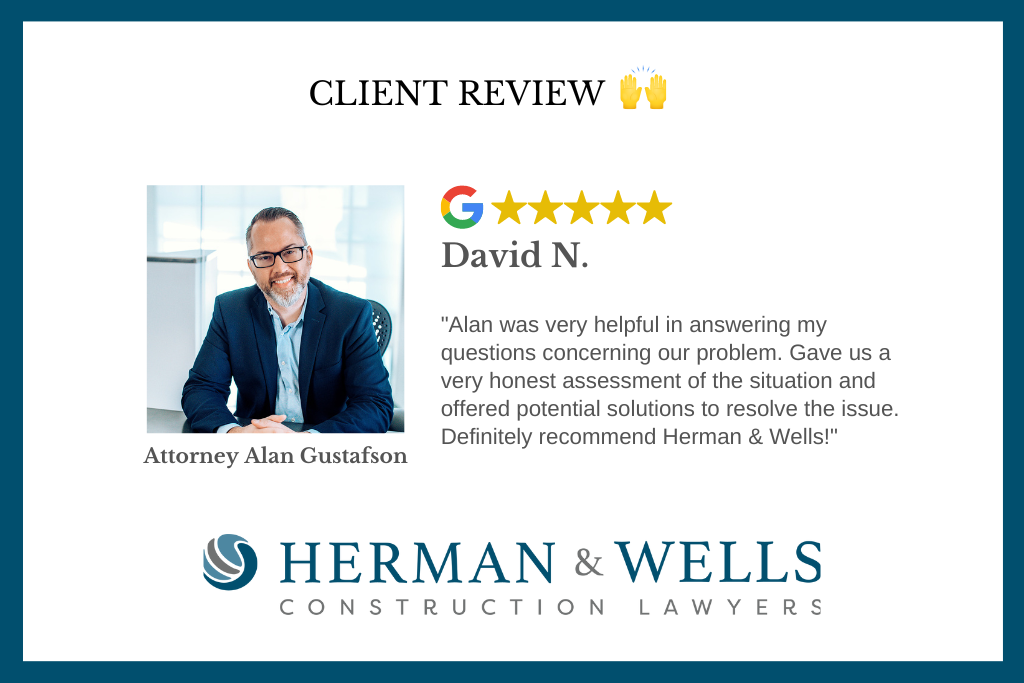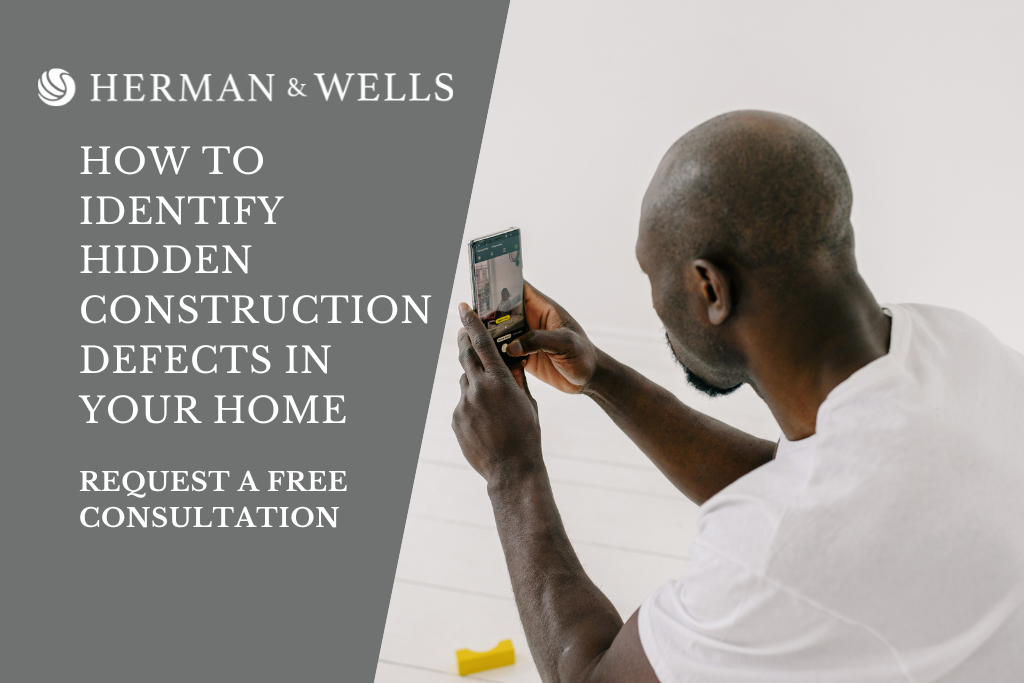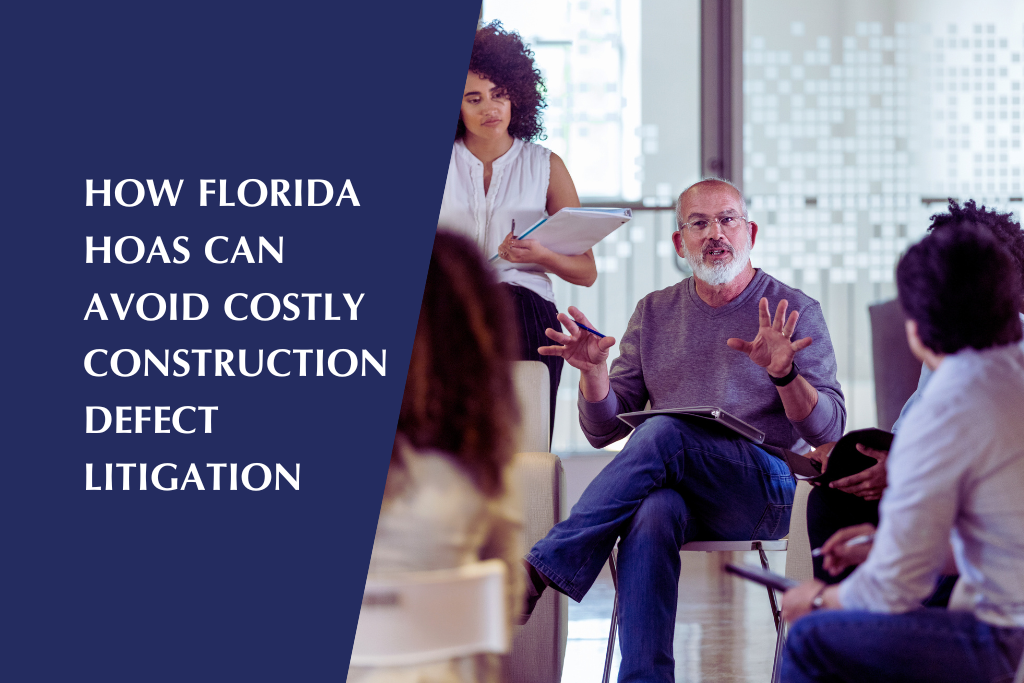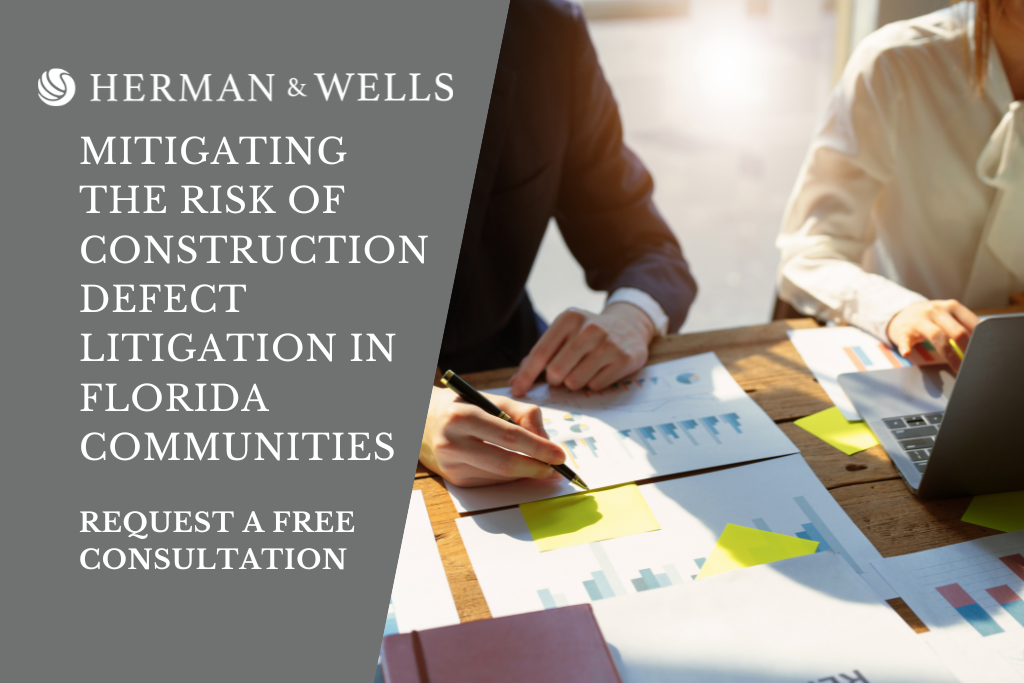With the ever-changing Florida building codes, it’s important for HOAs and COAs to stay up-to-date with common construction defects to protect their communities. While some defects can cause aesthetic damage, others can seriously jeopardize the safety of occupants. The purpose of this blog post is to equip HOAs and COAs with an understanding of common construction problems so that residents are well protected against potential harm and financial losses from issues related to faulty or poor construction practices.
Don’t leave the safety and financial well-being of your community to chance. Contact Herman & Wells today to schedule a consultation with our seasoned construction defect attorneys. Let us help you navigate the complex Florida building codes and protect your residents from potential harm due to common construction defects.

The Cliff Notes: Key Takeaways From This Post
- 1Regular and thorough inspections are crucial in spotting and documenting construction defects.
- 2Prompt reporting of defects is essential to prevent further damage and increase repair costs.
- 3Professional assessment by certified experts can provide valuable insights into the defect and aid in formulating an effective course of action.
- 4Proper documentation, including photographs, reports, and correspondence, is vital for legal proceedings related to construction defects.
- 5Seeking legal consultation early on can greatly benefit the resolution process and protect all parties’ interests.
- 6Proactive maintenance, collaboration with construction experts, and stringent quality control measures are effective strategies in addressing and preventing future construction defects.
- 7Early intervention is key to a successful resolution of construction defect cases. Engaging a construction defect lawyer at the earliest suspicion of a defect can save time, money, and hassle in the long run.
- 8Contact our experienced Florida construction defect lawyers for expert guidance and representation in addressing and preventing construction defects.
Understanding Construction Defects In Florida Properties
Construction defects in Florida properties can range from structural integrity issues to water intrusion, each carrying its own set of potential hazards. The result of poor workmanship, substandard materials, or design deficiencies, these defects are not only a financial burden, but can also pose serious health and safety risks to occupants. It’s imperative that HOAs and COAs understand these defects, their implications, and the rights and responsibilities they have when addressing these issues. Stay vigilant, stay informed, and remember, you don’t have to navigate these complexities alone.
The Role Of Florida Construction Defect Lawyers
Florida construction defect lawyers play a pivotal role in safeguarding the interests of HOAs and COAs. They possess the knowledge and expertise to scrutinize construction practices, identify defects, and ensure compliance with Florida building codes. With their guidance, communities can proactively handle construction issues, mitigating risks and financial burdens.
Key Steps To Identifying And Documenting Construction Defects
Effective identification and documentation of construction defects is paramount in ensuring the safety and protecting the financial interests of your community. Herein are key steps that HOAs and COAs should take to promptly spot and document any construction irregularities:
Regular And Thorough Inspections
Regular and thorough inspections of the property are the first line of defense against construction defects. These inspections should be comprehensive, covering all areas of the property, and should be conducted by qualified experts who can effectively identify potential issues.
Prompt Reporting
Once a construction defect is identified, it is crucial that the issue is reported immediately. Delay in reporting can exacerbate the problem, potentially leading to more extensive damage and higher repair costs.
Professional Assessment
A professional assessment by a certified engineer or building inspector can provide a detailed analysis of the defect. Their expert opinion can be instrumental in formulating the best course of action to remedy the issue.
Documentation
Proper documentation is crucial in the event of legal proceedings. This includes photographs, reports, and any correspondence related to the defect. Having comprehensive records can significantly strengthen your case if it goes to court.
Legal Consultation
Consulting with a construction defect attorney can provide invaluable guidance on the next steps and potential legal actions. They can advise on the best course of action based on the severity of the defect, the cost of repair, and the potential impact on property value.
Legal Options And Remedies For Construction Defects
When construction defects are detected, legal remedies are available to HOAs and COAs to rectify the situation. These may include the recovery of damages for repair costs, loss of use, and in some cases, punitive damages. However, the exact course of legal action largely depends on the nature of the defect and the specifics of the case.
Navigating The Claims Process: A Guide For Florida HOAs And COAs
The claims process for construction defects can be intricate and daunting, particularly for those unfamiliar with the legal landscape. With a well-defined plan of action, backed by experienced legal representation, HOAs and COAs can efficiently navigate this process, ensuring minimal disruption and optimal outcome for their communities.
Effective Strategies For Addressing Construction Defects
Proactive maintenance is a key strategy in addressing construction defects. This involves a regular maintenance schedule and conducting routine checks to catch any potential defects early on, preventing them from escalating into more serious issues. Swift action and timely repairs can help avoid extensive damage and costly remediation efforts, ensuring the safety and well-being of the residents.
Collaboration with professional construction experts is another effective strategy. Specialists, with their extensive knowledge and technical skills, can provide valuable insights into potential defect sources and suggest appropriate corrective measures. Additionally, they can offer advice on preventive practices to avoid future defects, empowering HOAs and COAs to better manage their properties and protect their residents.
How To Avoid Future Construction Defects
Insights And Best Practices For HOAs And COAs
Preventing future construction defects largely hinges on employing stringent quality control measures during the construction phase. This includes hiring reputable contractors, using high-quality materials, and implementing rigorous oversight protocols to ensure compliance with building codes and standards. Additionally, regular training and education on the latest construction techniques and practices can help stave off potential defects. Remember, an ounce of prevention is worth a pound of cure, and these preventative strategies can save HOAs and COAs substantial costs and inconvenience down the line.
When To Contact A Construction Defect Lawyer In Florida
Engaging a Construction Defect Lawyer should be a priority as soon as you suspect a construction defect in your property. These legal experts can expedite the resolution process, ensure proper documentation, and aid in obtaining the maximum possible compensation. Remember, early intervention is key to a successful resolution and to protect all parties’ interests.
Schedule A Consultation With Our Experienced Florida Construction Defect Lawyers
In conclusion, addressing and preventing construction defects requires vigilance, expertise, and a keen understanding of property management. Be proactive, seek professional insights, and prioritize regular inspections to protect the interests of your HOA or COA.
Contact a Florida construction defect lawyer at the earliest suspicion of a construction defect to ensure a swift and favorable resolution. Call (727) 821-3195 to schedule a free consultation today!





